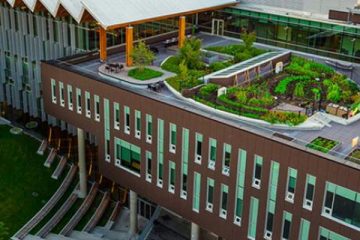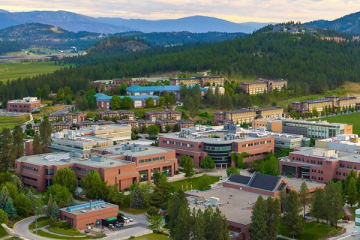
Emissions reductions has been a priority for UBC for the past two decades. UBC achieved its Kyoto Protocol targets for academic buildings five years ahead of schedule through major energy efficiency upgrades, and in 2010 and 2015 developed the university’s first two Climate Action Plans with a focus on campus operations.
Building on this, the UBC Climate Action Plan 2030 (CAP 2030) puts the university on an accelerated path to net zero emissions for buildings and energy supply as well as to significantly reduce greenhouse gas emissions for extended impact areas over the next 15 years, aligning with the Paris Agreement goal of keeping global temperature rise within 1.5°C.
Distinct CAP 2030 plans for both the Vancouver and Okanagan campuses were developed simultaneously and was presented for endorsement by the UBC Board of Governors in December 2021. Included, for the first time, is UBC’s explicit commitment to reducing emissions from extended impact sources beyond the University’s direct control – these include emissions from UBC-related commuting, food systems, waste and materials, and business air travel.
Alongside clean, renewable and low carbon energy solutions, energy-efficient technologies, and institutional change, meeting these targets will require deep community participation. Through emerging and expanding climate-related programs, policies, tools, resources, campaigns and engagement, UBC is committed to supporting students, faculty and staff in taking climate action, and championing research, staff expertise and student collaborations related to the climate emergency.
UBC GHG emissions reductions targets
- 2030
85% reduction in campus operations emissions
This reduction would significantly exceed the 45% Paris Agreement emissions reduction target to keep global warming to 1.5°C. Reducing emissions by 85% translates to eliminating virtually all conventional fossil fuel use from campus operations.
45% collective reduction in emissions from extended impact sources
Encompasses emissions associated with commuting, business air travel, food, waste and materials, and embodied carbon. This will keep the university’s reductions in alignment with the Paris Agreement’s 1.5°C target.
- 2035
100% reduction in operational greenhouse gas emissions
This target accelerates 15 years ahead of UBC’s original net zero target (2050).
Related Resources

UBC Vancouver Climate Action Plan 2030
CAP 2030 is enabling UBC to accelerate the pathway to becoming net zero through clean energy solutions and energy-efficient technologies, as well as identifying new ways to reduce emissions related to commuting, food, waste, and business air travel.

UBC Okanagan Climate Action Plan 2030
The Okanagan CAP2030 plan will chart a course to accelerate emissions reductions from core operations, as well as identifying new ways to reduce emissions related to commuting, food, waste, and business air travel.

How you can take action with CAP2030
We’re building out new resources to enable every member of the UBC community to take action to reduce the GHG emissions associated with studying, working, and living at UBC.

Climate Change Mitigation in Developing Countries (University of Cape Town)
Students are challenged to consider how societies might be lifted out of poverty while also mitigating greenhouse gas emissions, by exploring the complexity of governments wanting to grow their economies and remain climate friendly.

2014 | 1 hr 15 min
Follow a Vancouver couple as they decide to eat only rescued food for six months and find truckloads of perfectly edible food destined for the landfill.

